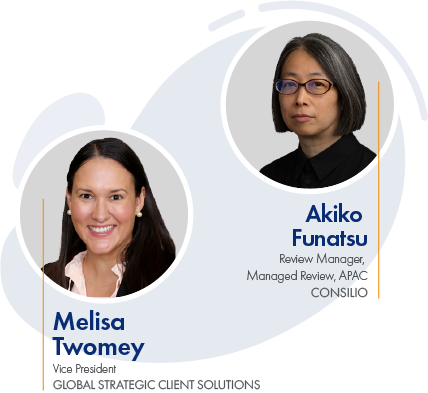Consilio in Action: Discussing Transcending Cultural and Language Barriers to Help Clients Succeed
In today’s global economy, it is common for legal work to transpire across time zones and include multi-lingual challenges on a daily basis. That reality is all too familiar for Consilio superstar Akiko Funatsu, who plays a pivotal role in helping Consilio’s U.S. clients navigate projects on the ground in Japan.
“Akiko has been invaluable to building relationships with clients who have offices in Japan,” says Melisa Twomey, a member of Consilio’s Strategic Client Solutions and Business Development teams. “She’s strategic in how she thinks about interactions and works well internally, looking for ways for all of us to collaborate within our accounts.”
On a day-to-day basis, that means Akiko is wearing several hats at once, working with people in both hemispheres on various aspects of projects, and helping major corporations to bridge both language and cultural divides. What’s her secret to success? “I’m trying to keep our clients happy,” she says.
Serving as a Translator of Both Language and Culture
Consilio works with some of the world’s biggest corporations that have a Japanese presence, from major electronics manufacturers to pharmaceutical giants. Like most international projects, these matters present some significant language barriers, but in the case of Japan, there are some notable cultural differences as well. Akiko is instrumental in helping both sides navigate them all.
Many of these engagements involve large projects where the client is making strategic decisions about the matter in the U.S., but document review takes place in Japan, with documents in Japanese. Nearly everything needs to be translated, not just between English and Japanese, but in a cultural sense as well.
“Japanese corporate culture is very unique,” Akiko explains. “People don’t talk really out loud or say things clearly to your face. It’s not so easy to read between the lines. Everything needs to be deciphered.” For Akiko, communication is key to succeeding on these projects. “My approach is to try to communicate with our clients as much as possible, maybe even more than is required.” Either way, she makes sure to communicate with clients on a daily basis, sometimes even two or three times a day.
For example, Akiko and Melisa worked together on a project for a major U.S. manufacturer that involved multiple internal and external investigations in Japan. All the data was in one database, but they conducted three separate reviews over a period of time. “I think that might have been one of my first experiences working with Akiko,” Melisa recalls, “and I just remember being really impressed and relieved that she was involved. She did a great job getting everybody on the same page when we were on a call, knowing that it was a tricky project and not everyone spoke the same language. We always knew where we stood at the end of each day.”
This particular client had very specific reporting requirements and metrics, above and beyond the level of detail a typical client wants. “It can be very hard for our clients to understand how good our work product is because they don’t speak Japanese,” Akiko says. “But even when they don’t ask questions, I make sure to explain it.” As Melisa attests, Akiko kept the project moving forward for the teams in both languages, and Consilio is now the client’s go-to provider for Japanese projects.
Akiko’s translation skills go beyond just the client and the reviewers on the ground, but are invaluable to the Consilio team as well. “She’s also been a great resource for me and helpful in answering any of my questions about properly utilizing surnames and suffixes when addressing Japanese clients,” Melisa says. Akiko’s ability to keep all aspects of Consilio’s Japanese projects moving forward is critical to success, especially at a time when the workload is growing rapidly.
Bridging a Legal Divide
At the end of the day, getting the law right is of utmost importance. However, U.S. law and Japanese law are very different, Akiko explains. “We mostly hire Japanese reviewers who were not educated in the U.S., so I have to also legally translate the project requirements to our reviewers so they understand exactly what our U.S. counsel need.”
Much of Akiko’s success is fueled by her dedication to her work. “eDiscovery is a really important job,” she says. “Law didn’t exist by itself, we invented it. We designed it so that we have a greater, better society. Combining technology with our understanding and experience in different legal systems lets us make some contribution to that.”
As with all projects Consilio handles, client satisfaction is a top priority in its Japanese operations. “We’ve built these relationships with the client and told them that they can trust us, that we’re their strategic partner,” Melisa concludes. “We’re passionate about sticking to our word on that and ensuring that they’re having a good experience. In the case of our Japanese clients, Akiko expertly handles that. She’s responsive and strategic and always willing to help.”
It’s employees like Akiko that help Consilio succeed at building strategic partnerships and keeping their clients happy, in the face of language, cultural, and even legal barriers. With Akiko on their team, Consilio will continue to prove its excellence in the Japanese market for years to come.
